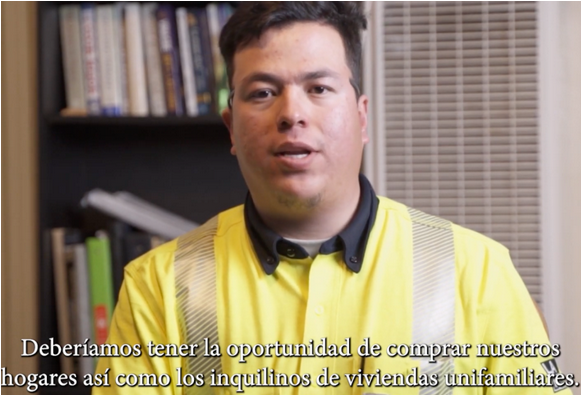Last year, Governor Gavin Newsom signed Senate Bill 51 (S.B. 51) to regulate how Caltrans should proceed with selling rental properties along what would have been the I-710 corridor. Opposition from existing renters, many of whom have been promised first chance to purchase properties for literally generations, did little to slow the bill's progress into law.
Earlier today, the United Caltrans Tenants union uploaded a video letter to YouTube on behalf of Caltrans renters in El Sereno asking Senator María Elena Durazo, who introduced S.B. 51, to introduce a new bill to amend S.B. 51. At issue is a provision in S.B. 51 that bans current tenants from creating a co-op to purchase and rehab properties in El Sereno. Tenant/owner co-ops are allowed and still given priority for properties sold by Caltrans in other parts of the corridor including Pasadena and South Pasadena.
Since S.B. 51 has passed, several "housing-related entities" have purchased properties in El Sereno with the intent to turn them into affordable rental housing. In addition, Los Angeles City Councilmember Kevin de León has been pushing the El Sereno Vision Plan to purchase 77 more properties and redevelop them to create over 250 units of affordable housing.
"Dear Senator Durazo, we are all El Sereno residents and long-term Caltrans tenants [living in multi-family homes] who had for many years the hope, the expectation, the dream to buy our homes. Just like the single-family tenants protected by the Roberti bill," says Isabel Lomeli in the video, on behalf of the El Sereno tenants.
The Roberti bill, passed in the 1960s, allowed Caltrans to purchase the property while also requiring the agency to grant qualified tenants - previous owner/occupants and present occupant/renters that had lived in the homes for a certain amount of time (including those that had formed a co-op) - the opportunity to purchase the property, should the I-710 not be built.
The open letter outlines several ways in which the city, Durazo, and other groups that have purchased property from Caltrans in the 710 Corridor can make the sales process work for existing residents. These asks include:
- New legislation that allows existing residents to form a co-operative to purchase land;
- That land purchased at a discounted rate by non-profit developers be sold back to residents' co-operatives;
- That the city not compete with existing tenants in purchasing El Sereno properties.
While the residents continue to lobby the city and state for a different process, they are also forming their own land trust to compete for currently Caltrans' owned properties: the El Sereno Community Land Trust. The Land Trust is partnering with other groups, including Habitat for Humanity, to create bids that would allow the properties to be owned by residents instead of non-profit or corporate entities.
The video ends with personal pleas from a dozen existing Caltrans tenants asking for a chance to purchase their families' homes; for some, the homes are the only ones they've ever known.
"I have been living here my whole life," says Elizabeth Ortega, a Caltrans tenant for 22 years. "I think it would be just to allow us and other tenants to purchase our homes."
Streetsblog's San Gabriel Valley Coverage is supported by Foothill Transit, offering car-free travel throughout the San Gabriel Valley with connections to the new Gold Line Stations across the Foothills and Commuter Express lines traveling into the heart of downtown L.A. To plan your trip, visit Foothill Transit. “Foothill Transit. Going Good Places.”
Sign-up for our SGV Connect Newsletter, coming to your inbox on Fridays.






